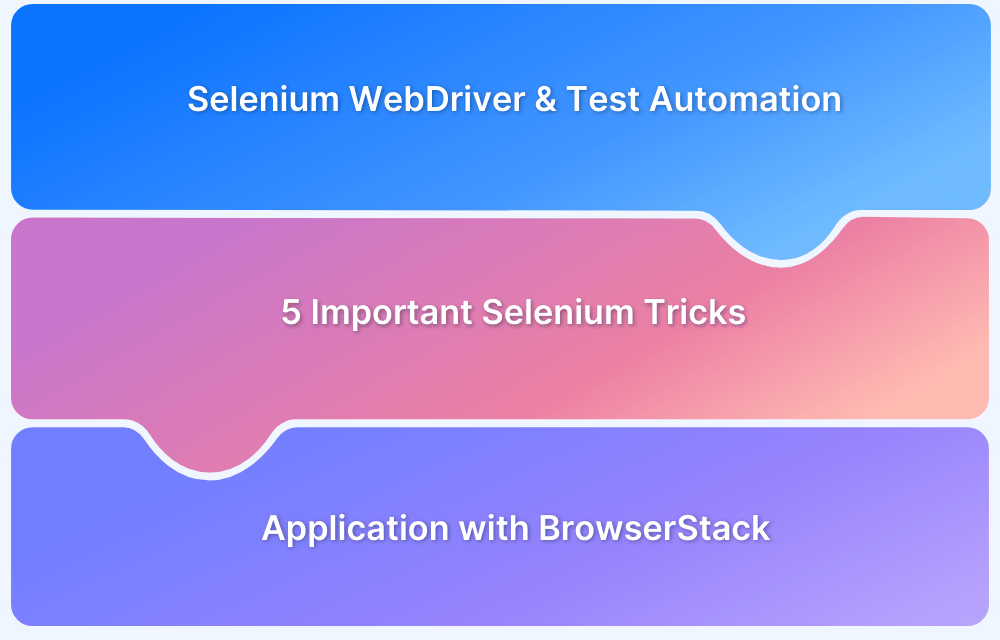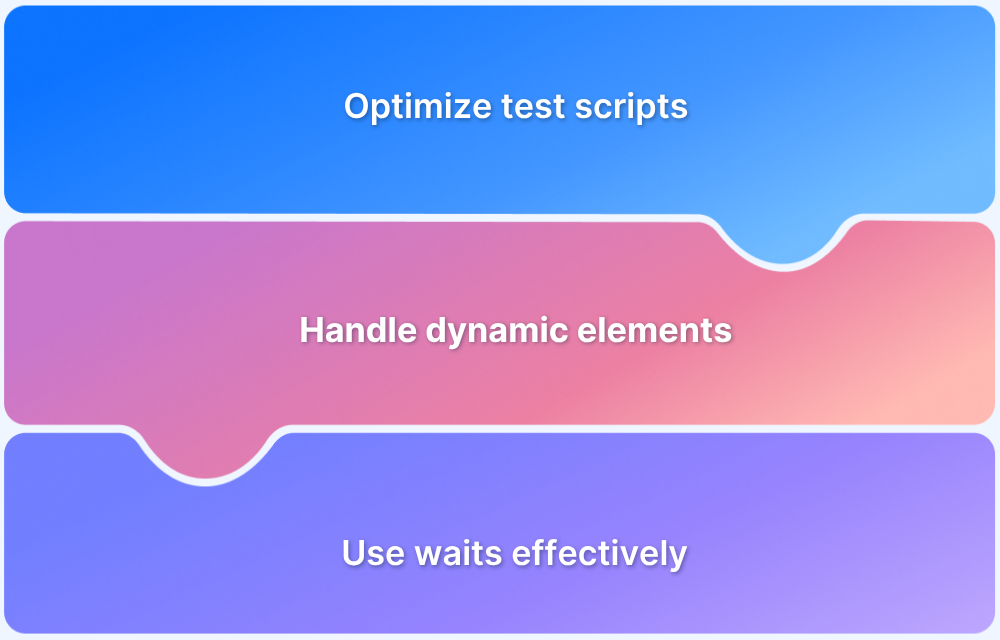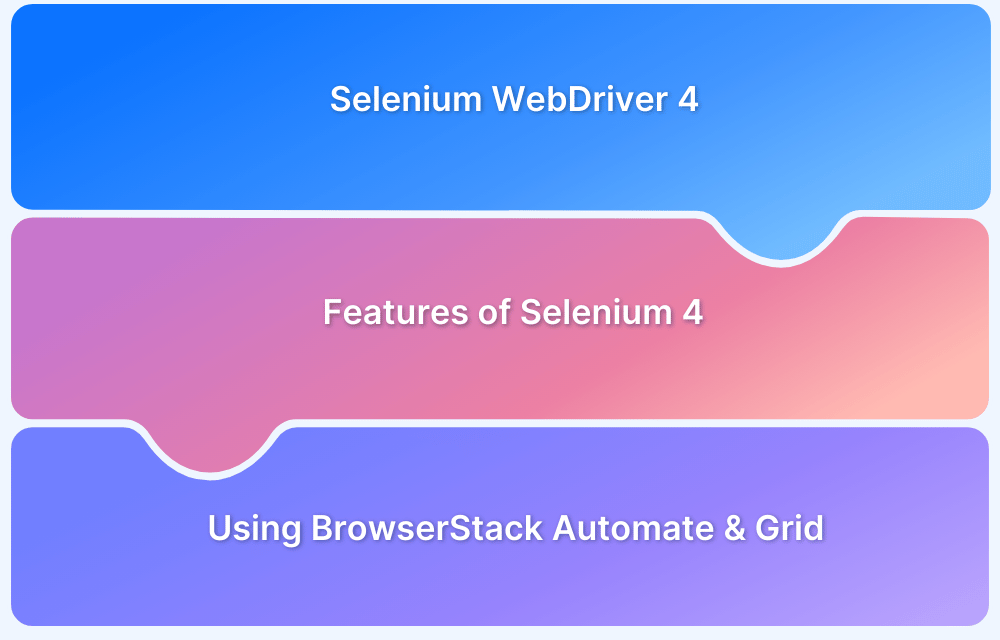For some time, Selenium was the de-facto framework for test automation and was considered a standard for DevOps teams. It was the preferred testing tool as it allows test engineers to write test scripts in their native programming language. Selenium is an open-source tool, and its suite has components like Selenium WebDriver, Selenium IDE, and Selenium Grid.
Selenium WebDriver is ideal for engineers writing scripts, Selenium IDE suits beginners with its record-and-playback features, and Selenium Grid enables parallel testing across multiple devices.
Despite having all the qualities of a test automation tool, certain pitfalls result in looking for alternatives.
Overview
Top 6 Selenium Alternatives For Test Automation
- Puppeteer
- Cypress
- WebdriverIO
- Playwright
- Cucumber
- NightwatchJS
This guide discusses the key features of many Selenium alternatives that have emerged.
Why look for Selenium Alternatives?
But first, here are the reasons why users are looking for Selenium Alternatives:
- Coding required: The DevOps engineers should focus on coding & innovation, whereas non-technical tasks can be assigned to testers. Now, the other testing tools than Selenium need coding only. It could pave the way for some new learning opportunities for non-coders.
- No built-in image comparison: Selenium doesn’t have an indigenous feature of a built-in comparison solution. It requires a third-party solution like Sikuli to offer this feature.
- Lacks Reporting capabilities: Selenium doesn’t support full-fledged reporting as it requires third-party plugins to provide such a feature.
- No support for native or mobile web: Selenium is a widely used portable framework for testing web applications, but it doesn’t provide support to test native mobile or mobile web applications.
Top 6 Selenium Alternatives For Test Automation
Here are the top 6 Selenium alternatives for Test Automation:
1. Puppeteer
Puppeteer is a Node library that provides a high-level API to control headless Chrome or Chromium over the DevTools Protocol. It empowers programmers to interact with a web browser as an object, calling methods such as .goto() or .type(). It is maintained by the Chrome DevTools team and is a browser-driven framework.
Key Features of Puppeteer
- Comes with more control over Chrome
- Enables web scraping
- It comes with the ability to take screenshots and PDFs of pages for UI testing
- Measures load times through the Chrome Performance Analysis tool
Also Read: Key Differences between Puppeteer & Selenium
2. Cypress
Cypress is also an open-source test automation platform, and its 4 Bundle was released on 10/15/20. Its tools align with the latest development principles, making it a preferred option over Selenium for developers. It has two types of tools:
- Cypress Test Runner for running tests in the browser
- Cypress Dashboard for a suite of CI tools
Key Features of Cypress
- It works in real-time. Thus, you can write the test when building an application.
- Get the test snapshots from Command Log
- Automatic assertions
Also Read: Key Differences between Cypress & Selenium
3. WebdriverIO
The Webdriver IO framework is built to automate modern web and mobile applications. It is an end-to-end testing framework founded by the OpenJS foundation. It is also a NodeJS-based application that can test applications using JavaScript/TypeScript. Mostly WebdriverIO is used with WebdriverProtocol since it provides rich features like cross-browser testing. Unlike Cypress, it doesn’t offer any commercial option.
Key Features of Webdriver IO
- Scalable, robust, and stable test suite
- Built-in and community plugins allow extending your setup as per your requirement.
- Comes with native mobile application testing
- Easy to Set up
Also Read: Cypress vs WebdriverIO: Key Differences
4. Playwright
Playwright is an open-source test automation library developed by Microsoft contributors. It is a Node.js library to automate browsers based on Chromium, Firefox, and WebKit through a single API. It comes with Apache 2.0 License and supports programming languages such as Java, Python, C#, and NodeJS. It is considered more suitable to use with NodeJS with Javascript/Typescript.
Key Features of Playwright
- Easy Setup and Configuration
- Comes with multi-browser support like Chrome, Edge, Safari, and Firefox
- Comes with the multi-language backing like Java, C#, Python, and Javascript/Typescript
- It comes with the parallel browser testing capabilities
- Supports multiple tab/browsers
Learn More: Playwright vs Selenium: A Comparison
5. Cucumber
Cucumber is another well-known Selenium alternative and functions as an automation tool for behavior-driven development (BDD). It was originally written in the Ruby programming language but now supports Java and JavaScript. It is preferred over Selenium as it allows the user to test scenarios without coding by using a scripting language called Gherkin.
Key Features of Cucumber
- It helps to engage business stakeholders who can’t read code
- It mainly focuses on end-user experience
- It allows the reusing of code in tests because of the easy writing style.
- Easy to set up and execute
6. NightwatchJS
NightwatchJS is a Node.js based framework that utilizes the Webdriver Protocol. It is developed and maintained by BrowserStack. With Nightwatch, you can seamlessly conduct a wide range of testing, including End-to-End testing, component testing, visual regression testing, accessibility testing, API testing, unit testing, and integration testing.
The best part is that you can use the same framework for native mobile app testing as well.
Key Features of Nightwatch
- NightwatchJS is easy to install and setup
- NightwatchJS test scripts are more readable
- It can be used for different types of testing
- It supports multiple browser testing, such as Chrome, Firefox, Edge, etc.
- It supports native mobile app testing as well
- NightwatchJS framework is easy to customise or extend
- NightwatchJS supports page object pattern
Things to consider before choosing a Selenium Alternative?
Here are the factors to consider before choosing a Selenium alternative for your test automation:
- Project scope: Consider whether the testing tool supports your specific needs, such as web-only applications, mobile apps, APIs, or desktop software.
- Language support: To streamline adoption and development, ensure the tool is compatible with your team’s preferred programming language.
- Ease of setup: Evaluate how simple it is to install, configure, and start using the tool without requiring extensive setup or infrastructure.
- Execution speed: Check if the tool offers fast test execution and supports features like parallel test runs and headless mode to optimize testing time.
- CI/CD integration: Confirm that the tool integrates seamlessly with your existing CI/CD systems like Jenkins, GitHub Actions, GitLab, or others.
- Modern web support: Make sure the tool can effectively test modern web applications, including support for single-page applications (SPAs), Shadow DOM, and dynamic content.
- Debugging tools: Look for built-in debugging features such as detailed logs, screenshots, and video playback to help quickly identify and fix issues.
- Documentation and community: Assess the availability of thorough documentation, community forums, and ongoing maintenance to support your team.
- Scalability: Determine whether the tool can efficiently handle large-scale test suites and support testing across multiple environments.
- Cost: Review the pricing model, including whether the tool is open-source or paid, and what features are included in free vs. enterprise tiers.
Conclusion
While Selenium is widely used, alternatives like Cypress, Playwright, and Puppeteer can offer faster setup, better debugging, and improved performance for modern testing needs.
To get the best out of any framework, whether it’s Selenium, Cypress, Puppeteer, or Nightwatch.js, BrowserStack Automate lets you run tests at scale with parallel test execution, real device cloud access, and easy CI/CD integration, all without managing any test infrastructure.






